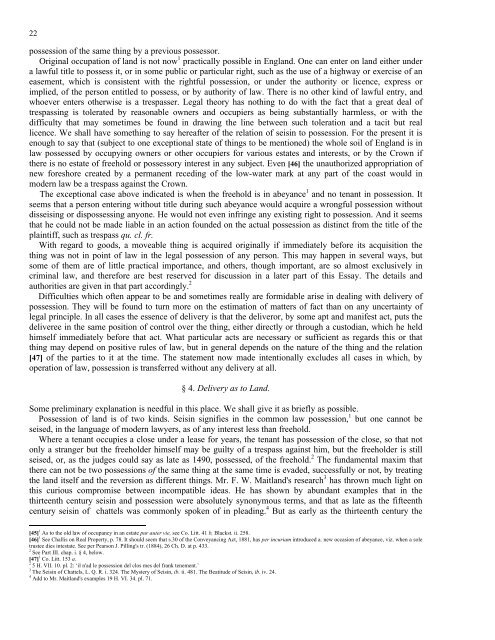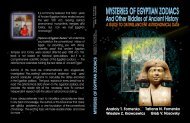possession in the common law - HiddenMysteries Information Central
possession in the common law - HiddenMysteries Information Central
possession in the common law - HiddenMysteries Information Central
Create successful ePaper yourself
Turn your PDF publications into a flip-book with our unique Google optimized e-Paper software.
22<br />
<strong>possession</strong> of <strong>the</strong> same th<strong>in</strong>g by a previous possessor.<br />
Orig<strong>in</strong>al occupation of land is not now 1 practically possible <strong>in</strong> England. One can enter on land ei<strong>the</strong>r under<br />
a <strong>law</strong>ful title to possess it, or <strong>in</strong> some public or particular right, such as <strong>the</strong> use of a highway or exercise of an<br />
easement, which is consistent with <strong>the</strong> rightful <strong>possession</strong>, or under <strong>the</strong> authority or licence, express or<br />
implied, of <strong>the</strong> person entitled to possess, or by authority of <strong>law</strong>. There is no o<strong>the</strong>r k<strong>in</strong>d of <strong>law</strong>ful entry, and<br />
whoever enters o<strong>the</strong>rwise is a trespasser. Legal <strong>the</strong>ory has noth<strong>in</strong>g to do with <strong>the</strong> fact that a great deal of<br />
trespass<strong>in</strong>g is tolerated by reasonable owners and occupiers as be<strong>in</strong>g substantially harmless, or with <strong>the</strong><br />
difficulty that may sometimes be found <strong>in</strong> draw<strong>in</strong>g <strong>the</strong> l<strong>in</strong>e between such toleration and a tacit but real<br />
licence. We shall have someth<strong>in</strong>g to say hereafter of <strong>the</strong> relation of seis<strong>in</strong> to <strong>possession</strong>. For <strong>the</strong> present it is<br />
enough to say that (subject to one exceptional state of th<strong>in</strong>gs to be mentioned) <strong>the</strong> whole soil of England is <strong>in</strong><br />
<strong>law</strong> possessed by occupy<strong>in</strong>g owners or o<strong>the</strong>r occupiers for various estates and <strong>in</strong>terests, or by <strong>the</strong> Crown if<br />
<strong>the</strong>re is no estate of freehold or possessory <strong>in</strong>terest <strong>in</strong> any subject. Even [46] <strong>the</strong> unauthorized appropriation of<br />
new foreshore created by a permanent reced<strong>in</strong>g of <strong>the</strong> low-water mark at any part of <strong>the</strong> coast would <strong>in</strong><br />
modern <strong>law</strong> be a trespass aga<strong>in</strong>st <strong>the</strong> Crown.<br />
The exceptional case above <strong>in</strong>dicated is when <strong>the</strong> freehold is <strong>in</strong> abeyance 1 and no tenant <strong>in</strong> <strong>possession</strong>. It<br />
seems that a person enter<strong>in</strong>g without title dur<strong>in</strong>g such abeyance would acquire a wrongful <strong>possession</strong> without<br />
disseis<strong>in</strong>g or dispossess<strong>in</strong>g anyone. He would not even <strong>in</strong>fr<strong>in</strong>ge any exist<strong>in</strong>g right to <strong>possession</strong>. And it seems<br />
that he could not be made liable <strong>in</strong> an action founded on <strong>the</strong> actual <strong>possession</strong> as dist<strong>in</strong>ct from <strong>the</strong> title of <strong>the</strong><br />
pla<strong>in</strong>tiff, such as trespass qu. cl. fr.<br />
With regard to goods, a moveable th<strong>in</strong>g is acquired orig<strong>in</strong>ally if immediately before its acquisition <strong>the</strong><br />
th<strong>in</strong>g was not <strong>in</strong> po<strong>in</strong>t of <strong>law</strong> <strong>in</strong> <strong>the</strong> legal <strong>possession</strong> of any person. This may happen <strong>in</strong> several ways, but<br />
some of <strong>the</strong>m are of little practical importance, and o<strong>the</strong>rs, though important, are so almost exclusively <strong>in</strong><br />
crim<strong>in</strong>al <strong>law</strong>, and <strong>the</strong>refore are best reserved for discussion <strong>in</strong> a later part of this Essay. The details and<br />
authorities are given <strong>in</strong> that part accord<strong>in</strong>gly. 2<br />
Difficulties which often appear to be and sometimes really are formidable arise <strong>in</strong> deal<strong>in</strong>g with delivery of<br />
<strong>possession</strong>. They will be found to turn more on <strong>the</strong> estimation of matters of fact than on any uncerta<strong>in</strong>ty of<br />
legal pr<strong>in</strong>ciple. In all cases <strong>the</strong> essence of delivery is that <strong>the</strong> deliveror, by some apt and manifest act, puts <strong>the</strong><br />
deliveree <strong>in</strong> <strong>the</strong> same position of control over <strong>the</strong> th<strong>in</strong>g, ei<strong>the</strong>r directly or through a custodian, which he held<br />
himself immediately before that act. What particular acts are necessary or sufficient as regards this or that<br />
th<strong>in</strong>g may depend on positive rules of <strong>law</strong>, but <strong>in</strong> general depends on <strong>the</strong> nature of <strong>the</strong> th<strong>in</strong>g and <strong>the</strong> relation<br />
[47] of <strong>the</strong> parties to it at <strong>the</strong> time. The statement now made <strong>in</strong>tentionally excludes all cases <strong>in</strong> which, by<br />
operation of <strong>law</strong>, <strong>possession</strong> is transferred without any delivery at all.<br />
§ 4. Delivery as to Land.<br />
Some prelim<strong>in</strong>ary explanation is needful <strong>in</strong> this place. We shall give it as briefly as possible.<br />
Possession of land is of two k<strong>in</strong>ds. Seis<strong>in</strong> signifies <strong>in</strong> <strong>the</strong> <strong>common</strong> <strong>law</strong> <strong>possession</strong>, 1 but one cannot be<br />
seised, <strong>in</strong> <strong>the</strong> language of modern <strong>law</strong>yers, as of any <strong>in</strong>terest less than freehold.<br />
Where a tenant occupies a close under a lease for years, <strong>the</strong> tenant has <strong>possession</strong> of <strong>the</strong> close, so that not<br />
only a stranger but <strong>the</strong> freeholder himself may be guilty of a trespass aga<strong>in</strong>st him, but <strong>the</strong> freeholder is still<br />
seised, or, as <strong>the</strong> judges could say as late as 1490, possessed, of <strong>the</strong> freehold. 2 The fundamental maxim that<br />
<strong>the</strong>re can not be two <strong>possession</strong>s of <strong>the</strong> same th<strong>in</strong>g at <strong>the</strong> same time is evaded, successfully or not, by treat<strong>in</strong>g<br />
<strong>the</strong> land itself and <strong>the</strong> reversion as different th<strong>in</strong>gs. Mr. F. W. Maitland's research 3 has thrown much light on<br />
this curious compromise between <strong>in</strong>compatible ideas. He has shown by abundant examples that <strong>in</strong> <strong>the</strong><br />
thirteenth century seis<strong>in</strong> and <strong>possession</strong> were absolutely synonymous terms, and that as late as <strong>the</strong> fifteenth<br />
century seis<strong>in</strong> of chattels was <strong>common</strong>ly spoken of <strong>in</strong> plead<strong>in</strong>g. 4 But as early as <strong>the</strong> thirteenth century <strong>the</strong><br />
[45] 1 As to <strong>the</strong> old <strong>law</strong> of occupancy <strong>in</strong> an estate pur auter vie, see Co. Litt. 41 b, Blackst. ii. 258.<br />
[46] 1 See Challis on Real Property, p. 78. It should seem that s.30 of <strong>the</strong> Conveyanc<strong>in</strong>g Act, 1881, has per <strong>in</strong>curiam <strong>in</strong>troduced a. new occasion of abeyance, viz. when a sole<br />
trustee dies <strong>in</strong>testate. See per Pearson J. Pill<strong>in</strong>g's tr. (1884), 26 Ch. D. at p. 433.<br />
2<br />
See Part III. chap. i. § 4, below.<br />
[47] 1 Co. Litt. 153 a.<br />
2<br />
5 H. VII. 10. pl. 2: ‘il n'ad le <strong>possession</strong> del clos mes del frank tenement.’<br />
3<br />
The Seis<strong>in</strong> of Chattels, L. Q. R. i. 324. The Mystery of Seis<strong>in</strong>, ib. ii. 481. The Beatitude of Seis<strong>in</strong>, ib. iv. 24.<br />
4<br />
Add to Mr. Maitland's examples 19 H. VI. 34. pl. 71.



